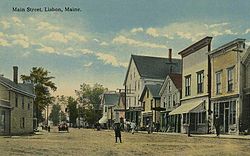Lisbon, Maine
| Lisbon, Maine | ||
|---|---|---|
| Town | ||

Main Street c. 1914
|
||
|
||
 Location of the town of Lisbon (in yellow) in Androscoggin County and the state of Maine |
||
| Location in the United States | ||
| Coordinates: 44°1′21″N 70°4′47″W / 44.02250°N 70.07972°WCoordinates: 44°1′21″N 70°4′47″W / 44.02250°N 70.07972°W | ||
| Country | United States | |
| State | Maine | |
| County | Androscoggin | |
| Incorporated | June 22, 1799 | |
| Area | ||
| • Total | 23.82 sq mi (61.69 km2) | |
| • Land | 22.82 sq mi (59.10 km2) | |
| • Water | 1.00 sq mi (2.59 km2) | |
| Elevation | 200 ft (61 m) | |
| Population (2010) | ||
| • Total | 9,009 | |
| • Estimate (2012) | 8,943 | |
| • Density | 394.8/sq mi (152.4/km2) | |
| Time zone | Eastern (EST) (UTC-5) | |
| • Summer (DST) | EDT (UTC-4) | |
| ZIP codes | 04250, 04252 | |
| Area code(s) | 207 | |
| FIPS code | 23-40035 | |
| GNIS feature ID | 0582563 | |
| Website | lisbonme.org | |
Lisbon is a town in Androscoggin County, Maine, United States. The population was 9,009 at the 2010 census. It is included in both the Lewiston-Auburn, Maine metropolitan statistical area and the Lewiston-Auburn, Maine Metropolitan New England city and town area. Lisbon includes the village of Lisbon Falls.
The community was originally part of Bowdoin, a township within the Kennebec Purchase. But because travel to attend town meetings was difficult, on June 22, 1799 the General Court of Massachusetts divided Bowdoin in two to create Thompsonborough. Residents, however, soon grew dissatisfied with the long name. Consequently, it would be renamed in 1802 as Lisbon, after Lisbon in Portugal. In 1808, Lisbon annexed the remainder of Little River Plantation (part of the Pejepscot Purchase) as Lisbon Falls. In 1840, part of Lisbon was set off as Webster.
With fertile and easily cultivated soil, farming was an early industry. Sawmills and gristmills were built using water power from the streams. Larger brick mills followed to manufacture textiles. In 1864, the Worumbo Mill was established to produce woolens, and would remain a principal employer until it burned in 1987. Today, the small mill town is largely a bedroom community for companies like Bath Iron Works and L.L.Bean and increasingly for people working in the Portland area.
...
Wikipedia


